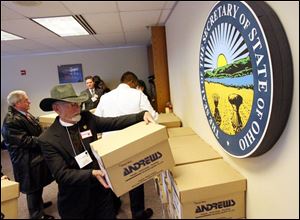
Anti-tobacco activists file petitions to ban most public smoking in Ohio
11/18/2005
Members of Tobacco-Free Ohio drop off boxes of petitions with 165,000 signatures at the Ohio secretary of state s office.
COLUMBUS - Anti-tobacco groups filed petitions containing the signatures of 165,000 people that could lead Ohio to become the first Midwest state to outlaw smoking in bars, restaurants, and virtually all other "enclosed" places where the public congregates.
Restaurants, bars, and other businesses immediately countered by urging the Ohio General Assembly to beat the signature-gatherers to the punch by passing a less restrictive law they hope Ohioans will ultimately find more attractive.
With supporters of the strict ban convinced that lawmakers won't pass a law that isn't punched full of loopholes, the final decision will likely be made at the ballot box in November, 2006.
"There will be a statewide policy," said Jacob Evans, lobbyist with the Ohio Licensed Beverage Association. "The question is what will that be? Will it be a total ban or a reasonable ban?"
Although they largely conceded the documented health risks of second-hand smoke, opponents posed the debate as an economic one.
They have yet to come up with language but said their "reasonable ban" would include exemptions for bars, private clubs, bowling alleys, and restaurants with separate, enclosed smoking areas.
"[Opponents'] idea of a reasonable compromise is the status quo," said Tracy Sabetta, spokesman for Tobacco-Free Ohio. "Our idea of 'reasonable' is treating everybody fairly and leveling the playing field."
If the secretary of state certifies that at least 96,780 of the signatures, equal to 3 percent of those who voted in the 2002 gubernatorial election, are indeed those of registered voters, lawmakers would have four months beginning in early January to act. They could ignore the petitions or enact an alternative law.
The strict ban supporters, however, have asked legislative leaders to do nothing, allowing the deadline to pass and paving the way for another petition effort this summer to put the issue on the fall ballot.
Knowing this, businesses that fear a smoking ban would chase away customers have urged the legislature to give them a law that they could hold up as an alternative when they ask voters to reject the stricter ban next year.
The strict ban being placed before lawmakers calls for warnings for anyone who violates the prohibition against smoking in a public place enclosed with a roof and walls on at least three sides. Subsequent violations within a two-year period would mean $100 fines for the individual smoker and fines escalating to as high as $2,500 for the business proprietor.
"We are veterans who laid down our lives for this country, and it's wrong to take away another freedom of choice," said Bob Bartley of Tipp City, president of Allied Clubs and Charities of Ohio. The fraternal and military organizations that make up its membership could be subject to the proposed ban if they have nonmember employees.
Both sides yesterday were armed with their own studies and public polls that presented very different pictures of public support and business impact. That's a sign of debate to come, whether it occurs on the floors of the General Assembly or in TV ads prior to the election.
Shirley Dwyer of West Toledo felt strongly enough about a strict statewide ban to set up a table to gather petition signatures in the parking lot of Wildwood Preserve Metropark.
"My father died with emphysema, and he had smoked all his life," she said. "I had bronchitis when I was 5, and my mother, who was a nonsmoker, ended up on oxygen 24 [hours a day], seven [days a week] for about three years, and that was from the second-hand smoke, apparently."
Dr. Jack Newton, who was president of the Toledo-Lucas County Board of Health when it passed a ban that was later struck down by the Ohio Supreme Court, said he was proud his board had started the ball rolling.
"It created a ripple effect that is showing up now,'' he said. "This is a health issue, not an economic issue."
Rich Fox, a nonsmoker from Toledo, lost his voice box to cancer that he believes was related to second-hand smoke.
"We're killing ourselves and killing each other by smoking in public places," he said.
Blade staff writer Luke Shockman contributed to this report.
Contact Jim Provance at:
jprovance@theblade.com
or 614-221-0496.